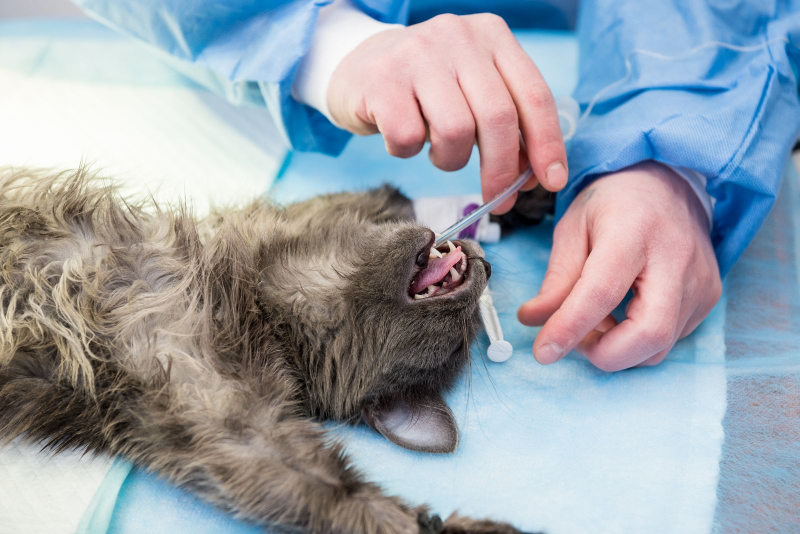Pet Tooth Extraction
Pet Tooth Extraction in Westwood and Pompton Lakes, New Jersey
Periodontal disease has implications for your pet’s overall health. In addition to the teeth and gums, it can affect other parts of the body like the heart, liver, and kidneys. The compassionate veterinarians at Westwood Regional Veterinary Hospital and Pompton Lakes Animal Hospital make every effort to treat problematic teeth. However, periodontal disease may be so advanced that tooth extraction is necessary. Pet owners in Westwood and Pompton Lakes, NJ, and the Tri-State area trust us for comprehensive veterinary dental care, including tooth extractions.

Why Are Pet Tooth Extractions Necessary?
When your pet’s teeth are healthy, it supports their oral health in general. Tooth extraction helps relieve pain from dental conditions and eliminates inflammation or infection. Oral health issues can also make it difficult for dogs and cats to eat. Extracting problematic teeth makes it easier for them to chew, potentially boosting their nutrition.
What happens during tooth extraction? Pet tooth extraction is a minor oral surgery that safely removes individual tooth roots. Pets are under general anesthesia to ensure their comfort and safety during the procedure. Veterinarians use specialized instruments to carefully extract damaged or infected teeth, then clean the area before applying sutures to the gums to facilitate healing.
Improper oral hygiene often results in tooth decay and advanced gum disease. Many pets experience periodontal disease, which is common in dogs and cats. Other reasons veterinarians might perform tooth extractions include:
- Removing broken or fractured teeth, which can cause infection or abscesses
- Removing deciduous (baby) teeth that don’t fall out on their own
- Correcting malocclusions (teeth misalignment)
- Aiding the treatment of oral tumors by extracting nearby teeth
- Addressing painful tooth resorption (internal tooth erosion) in cats
- Abnormalities (teeth sprouting in areas where they don’t belong)
- Stomatitis (swelling and inflammation in the mouth), such as chronic ulcerative paradental stomatitis (CUPS) and feline chronic gingivostomatitis
In addition to extracting teeth, these procedures allow veterinarians to analyze and record your pet’s baseline health, including body condition and temperature.
What to Expect With Cat and Dog Tooth Extraction
Pet dentists begin with a physical examination of the mouth. Some signs of damage are clear to the naked eye, such as fractured or loose teeth. However, it’s more common for teeth to appear healthy on the surface and be diseased below the gumline. Anesthesia-assisted dental exams enable a comprehensive evaluation of the teeth and mouth. Pet dentists will inspect the gums and teeth and may conduct X-rays for further assessment. Veterinary dental X-rays are performed at our Westwood location.
Our team’s goal is to treat teeth before extraction becomes necessary. If damaged teeth cannot be treated successfully, then tooth extraction is needed to help prevent health issues from progressing further.
Since pets must go under anesthesia for tooth extractions, they might wake up tired and feel that way throughout the day. This reaction is normal and should clear up the following day, as recovery from tooth extractions is quick. Most pets can come home on the same day as the procedure. If your pet needs to stay overnight, our experienced technicians will watch over them and you can call at any point to check on your furry companion.
You might notice traces of blood in your pet’s saliva for a few days following tooth extractions. This is normal but contact the veterinarian if your pet is bleeding excessively. Put away toys that encourage tugging until your pet’s mouth has fully healed and soften hard food in warm water before feeding your pet for a few days. It takes about two weeks for the mouth to heal entirely from tooth extraction.
Your pet might have unique considerations following a tooth extraction. You can trust our team to provide specific instructions on protecting your pet’s oral and overall health at home.
Comprehensive Dental Care in Westwood and Pompton Lakes, New Jersey
Tooth extractions are just one part of your pet’s dental care. Our pet dentists offer various services to help protect your pet’s oral health. Routine teeth cleaning and dental exams keep a dog’s or cat’s teeth free from plaque and tartar buildup and help veterinarians detect issues before they become bigger problems. Dental X-rays help guide diagnoses. Our team performs oral surgery using ultrasonic cleaners to address complex oral health concerns.
Motivated by a love for dogs and cats, we’re committed to providing pets and their human companions with the best experience. We use advanced tools for diagnosing and treating dental problems, getting a more accurate understanding of your pet’s oral health while ensuring their comfort.
Schedule Dog or Cat Tooth Extraction Today
Protect your pet’s oral health with tooth extractions from Westwood Regional Veterinary Hospital and Pompton Lakes Animal Hospital. This procedure is quick and performed with your pet’s safety in mind. Pet owners in Westwood and Pompton Lakes, NJ, and the Tri-State area can also explore specialized care options for their dogs and cats. Contact us today to learn more about our dental care services or to book an appointment.
Service Available At:
Westwood
- 346 Kinderkamack Rd.
Westwood, NJ 07675 - 201-885-5040
- Monday to Sunday: 9 AM to 10 PM
Pompton
- 9 Cannonball Rd. Pompton Lakes, NJ 07442
- 973-835-4774
-
Mon, Tues, Thurs, Fri: 11 AM – 8 PM
Wed, Sat: 10 AM – 3 PMSunday: Closed